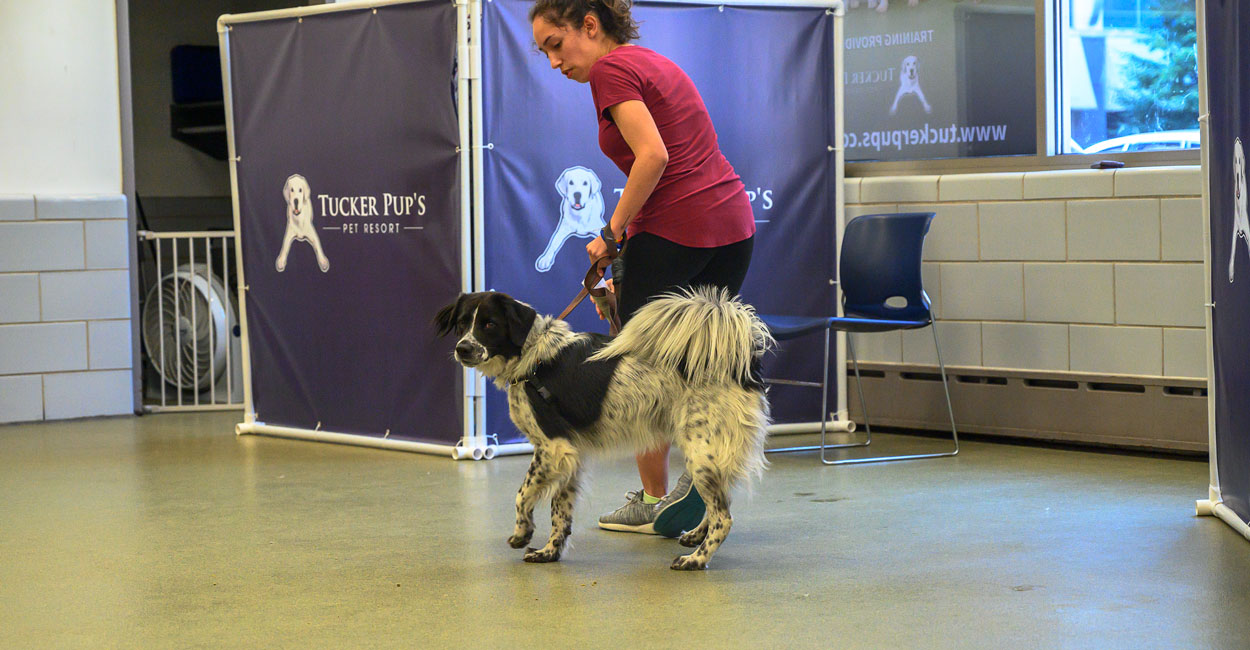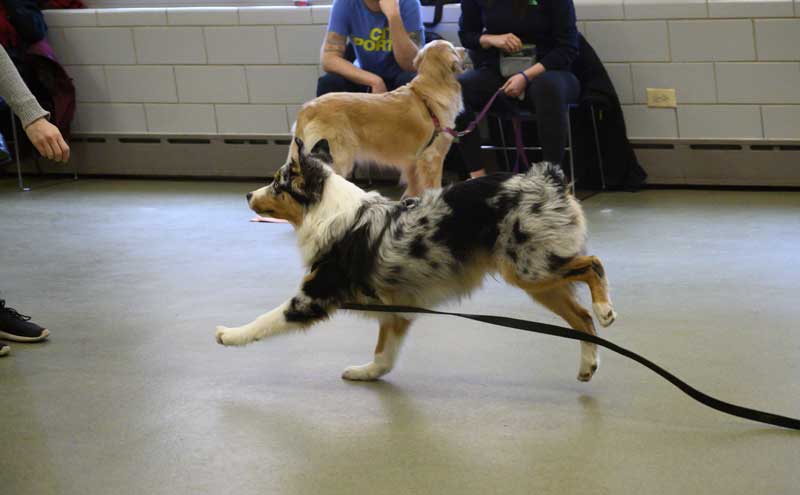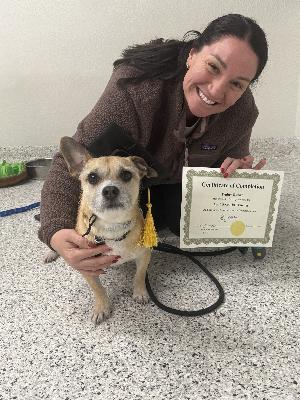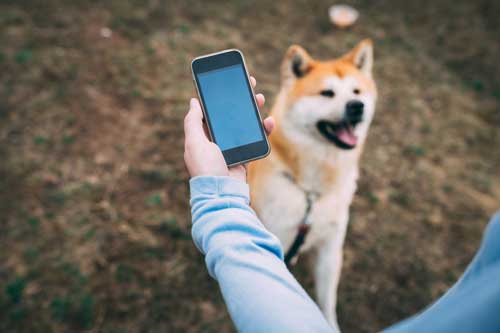
Our Leash Reactivity training class in Chicago is designed for dogs who lunge, bark uncontrollably, or otherwise become reactive when they see other dogs while on leash. These reactions can be stressful and frustrating for both you and your dog, but they’re often rooted in fear, frustration, or lack of impulse control—not aggression. In this focused class, our professional trainer uses positive reinforcement techniques to help your dog stay calm and feel more confident on walks. You'll learn how to read your dog’s body language, create space when needed, and apply practical strategies that you can use in real-world situations. We can help turn stressful walks into enjoyable outings where both you and your dog can relax and succeed.
Highlights from a Leash Reactivity Class
What is Included
- Core training skills. The course teach core training skills such as loose leash walking, listening the first time, focusing on you, and more.
- Leash reactivity strategies. In-depth strategies for navigating potentially challenging situations when approaching another dog or other triggers.
- Large barriers. We use large barriers during class, to keep the dogs hidden from each other until they are brought out for various exercises, usually no more than one or two at a time in the beginning. These barriers help your dog become desensitized towards others, see each other from a distance, and learn to build trust.
- Class discussion.
- Why your dog may be reactive
- How and why dogs learn
- How many people uninentionally create unwanted behaviors in their dog
- How to successfully use your voice, posture, body language, and more
- Corrective techniques that work
- Training equipment and rewards that we recommend
- And much more
- Access to TrainTrack™
- Videos of the exercises taught in class
- Written descriptions of the the exercises taught in class
- The homework for each session
- Ability to log your exercises and keep track of what you need to work on next
- Equipment. To help ensure you are as sucessful as possible, you will receive:
- Treat pouch
- Optional clicker
The room is spacious, the class size is small, and the trainer is highly experienced in helping dogs with reactivity issues.
Please note that this class is for dogs who are reactive towards other dogs, but not towards humans. If your dog has issues with humans, you should call us for private lessons.
Please also note that if your dog is simply excited when seeing other dogs, but not acting aggressively, this is probably not the right class for you. You might want one of our Manners classes or private lessons.
Enrollment Details
- You will have access to TrainTrack, so you can watch videos of any exercises covered in class
- You could attend another class for the one you missed, without your dog
- We don't recommend missing the final class, as this is the graduation
- Small class size - lots of personal attention
- Experienced, professional trainers with strong credentials
- Positive reinforcement only - no shock collars, choke chains, coercion, raised voices, or other negative methods
- Classes are fun and highly interactive
- Spacious classrooms. In a store like Petco, classes are in the middle of the store, and the area is very small
- Variety of times and days of the week to choose from
- Warm, professional atmosphere with a total commitment to customer service
- Proven track record of training thousands of dogs just like yours. For most dogs, our method can work over its lifetime, if implemented properly
- TrainTrack™, our proprietary online tool enabling you to watch videos of the exercises you have learned, log your progress, and track what needs the most work.
- Many types of classes, enabling you to continue building important skills
- Our trainers offer private lessons if you need help with behaviors not covered in class
If you want to enroll two dogs, there would need to be one adult per dog. One person cannot handle two dogs.
Don't delay - classes fill up quickly! We take enrollment 365 days per year, and answer calls from 7am to 7pm each day. Any request submitted after 7pm will be processed the next morning.
FAQs
How do you keep the dogs from trying to go after each other during class?
The dogs stay behind large barriers spread far apart from each other. Throughout the course, we bring the dogs out from the barriers, starting one at a time, then two at a time, and so forth, so they learn to feel safe with each other. By the end of the course, most of the dogs can tolerate being around the others.
Is there such a thing as too reactive for the class?
If your dog has extreme reactivity to the point of being a danger to himself or you, this class may not be the right fit, and our Behavioral Modification program may be more appropriate. Talk with us about this if you are wondering, and we can even have an in-person assessment to see what makes the most sense.
What if my dog is reactive towards humans, including possibly the trainer?
If you feel that your dog may cause injury to the trainer, you would need to implement safety precautions such as having a muzzle on your dog during class (which we can help you with), and having two leashes, in case one gets loose. We would need you to discuss this possibility with us up front, and we may determine that our Behavioral Modification program is more appropriate.
Can this class truly help my dog?
Most dogs who have gone through this course have shown tremendous progress, because they learn that other dogs are not a threat, and you learn strategies to help reduce their fear and anxiety while avoiding potential issues on the sidewalk. It is possible that your dog doesn't progress much at first, but keep in mind that we are giving you exercises and showing what to do at home. You then need to implement the strategies every day and build your dog's repetitions and trust. Your dog should show progress over time. If not, you may need to consider other possible causes of your dog's behavior, such as genetics, a medical issue, or deep mental health issues.
Will the dogs be off-leash at any time?
Absolutely not. All dogs are kept on leash and at a safe distance from each other. There are on-leash exercises where they may be somewhat near each other, if the trainer determines that it would not cause an unsafe risk.
Should I take the class, or should I sign up for the Behavioral Modification program with private lessons?
Both formats can be very helpful, and each has unique characteristics. One challenge with private lessons is that you need to find other dogs so you can work on desensitization. This can prove challenging, and is not really fair to the other dogs. On the other hand, classes have multiple other dogs who are in the same boat, so it can be easier to create the desensitization. Private lessons are based on one-on-one instruction, which can be helpful, but in the class, there is benefit to group exercises. It all just depends on your goals, budget, dog, and more. Many people atually end up taking the class and enrolling in the ehavioral Modification program, since both are so helpful.
I use a prong collar / choke chain on my dog because I have a hard time controlling him otherwise. Can I keep this on him during class?
Prong collars, choke chains, and shock collars are not allowed in class, as these are aversive tools that are not part of the positive reinforcement system. They reduce your dog's trust in you, can cause injury to your dog, and aren't really teaching your dog anything. Because we want you to get the most out of this course, we will need you to not have any of these tools on your dog during class, and ask that you don't use them during the week either. We will show you how to get results without using them.
My dog gets so stressed that he doesn't respond to treats. How will this work in class, which calls for the use of treats?
A lot of times, dogs can't respond to training or treats because their brain is so panicked and stressed in the moment. In the beginning classes, your dog may still be in this mental state, and that is OK. The goal is to keep showing your dog, week after week, that other dogs are not a threat, and this should help reduce stress and fear. Hopefully by the final class, your dog will be able to think more clearly and be more responsive to treats. If not, we recommend to just keep working on the exercises at home, and you will likely start to have breakthroughs. We can help you along the way if necessary, with private lessons.
Positive Reinforcement Methods
 Tucker Pup's only uses positive reinforcement methods. We do not use prong collars, choke chains, shock collars, poking, yelling, leash popping, or other aversive methods. Dominance can easily cause your dog to distrust you, and to only comply in order to avoid a negative outcome. This isn't truly learning, and can cause your dog's behaviors to become much worse.
Tucker Pup's only uses positive reinforcement methods. We do not use prong collars, choke chains, shock collars, poking, yelling, leash popping, or other aversive methods. Dominance can easily cause your dog to distrust you, and to only comply in order to avoid a negative outcome. This isn't truly learning, and can cause your dog's behaviors to become much worse.
Positive reinforcement is much more effective for creating long-term learning and a stronger relationship with your dog. Dogs love training when this style is being used, are much more responsive to their owners, and are much happier in general. In short, positive reinforcement gives you the best chance of success, and can be the fastest way to get results. If you are hesitant, please trust us on this one and feel free to ask us questions.
Positive reinforcement combines an encouraging tone of voice, clear instruction, relaxed body language, the use of rewards (e.g., treats, favorite toy), patience, and empathy.
If you are concerned about giving treats, keep in mind that they work very well for most dogs, you can phase them out at your discretion, and it is possible to use something else that your dog values, such as a favorite toy.
Customer Testimonial

Shaina continues to be a trusted resource for me and Walter as he navigates his emotions. She and Phaedra were consistently professional, knowledgeable, patient, and supportive throughout the Leash Reactivity course. I especially appreciate their transparency in acknowledging that the training is not a “quick fix,” but rather an opportunity to equip both the owner and the dog with practical, effective tools for long-term success.
- Abigail Rassel
TrainTrack™ Online Portal

Re-Watch Training Exercises on Your Device
The trainer will show you the exercises in person, then you can access TrainTrack to see the homework and other helpful information. Many exercises include videos, and all of them include instructions. It also includes handouts and a documentation of what you covered. This is incredibly helpful because there is a lot of information to take in, and it can be hard to remember everything that was demonstrated and discussed.
In addition, you can log your progress on TrainTrack as you are working on your home exercises. This can be invaluable for ensuring that you spend enough time, in various settings, for your dog to learn the methods thoroughly.
For private lessons, you can even upload videos to your trainer, and they can watch them in between sessions to help provide advice.
TrainTrack works on any Internet-connected device, so you can use it on your mobile phone, even when you're on a walk or working outdoors.
TrainTrack is used for all of our training services, including private lessons and classes.
To access TrainTrack, you must log in to our website. On your Customer Center, you will see the link to TrainTrack towards the top of the page.
Customer Reviews

Yelp has listed Tucker Pup's as one of the top 100 local businesses in the country in 2025. We are the only pet business who made the list from Chicago, and the only pet resort / training business who made the list nationally.
See the List
Neighborhoods We Serve
Tucker Pup's is located in the West Loop / Fulton Market District neighborhood. People come to us from all over Chicago, especially from Bucktown, Gold Coast, Lake View, Lincoln Park, Old Town, River North, River West, South Loop, Streeterville, Ukrainian Village, University Village, West Town and Wicker Park.


